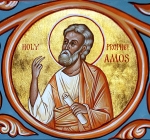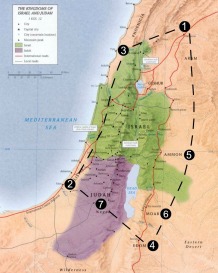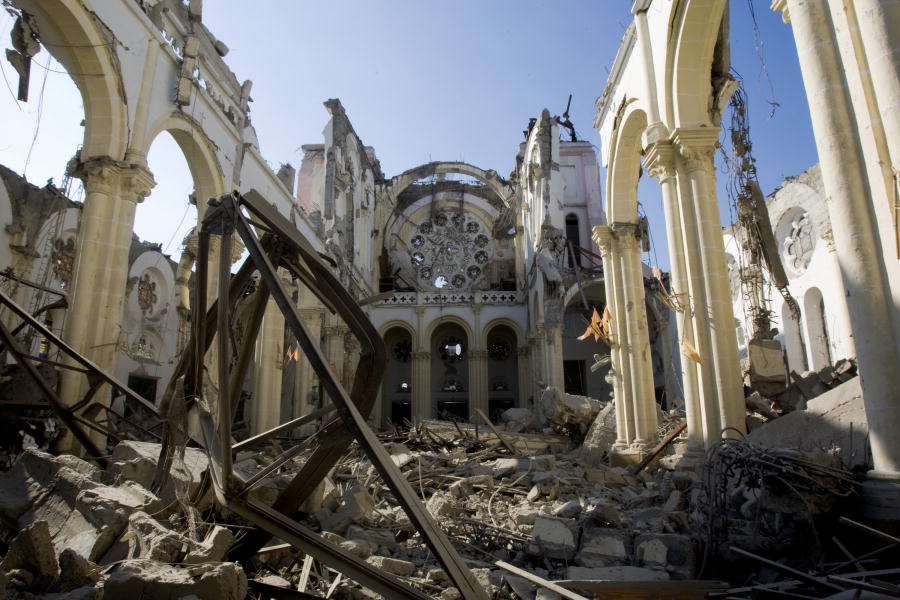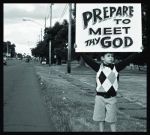
“Moses went up from the plains of Moab to Mount Nebo, to the top of Pisgah, which is opposite Jericho. And the Lord showed him all the land, Gilead as far as Dan, all Naphtali, the land of Ephraim and Manasseh, all the land of Judah as far as the western sea, the Negeb, and the Plain, that is, the Valley of Jericho the city of palm trees, as far as Zoar. And the Lord said to him, “This is the land of which I swore to Abraham, to Isaac, and to Jacob, ‘I will give it to your offspring.’ I have let you see it with your eyes, but you shall not go over there.” So Moses the servant of the Lord died there in the land of Moab, according to the word of the Lord, and he buried him in the valley in the land of Moab opposite Beth-peor; but no one knows the place of his burial to this day” (Deut. 34:1-6).
I am personally invested in the enterprise of international education. Since the advent of air travel, the opportunities for students to learn about their world, and how they fit into, have expanded exponentially. Every academic insitution worth its salt knows that studying abroad is an extraordinarily potent and life-changing element of any student’s education.
Those who work in the field of global education are an interesting lot. Having had their appetites whet through their own international experiences, they ceaselessly encourage students to have similar experiences. They know that, students who want to be global leaders need to experience being immersed into another culture. Then, and only then, can one develop what is professionally called “intercultural competency … a crucial skill-set in today’s global workplace, where employees are more likely to interact with co-workers, vendors or customers from different cultures and countries, and need to work productively with people who have been shaped by different values, beliefs and experiences.”*
For many international education workers, their wanderlust and international mobility has afforded them exotic well-traveled lives. Most acknowledge that, with each additional cross-cultural experience, they are more comfortable everywhere.
But home nowhere.
Moses was a true international.
Moses was born into a clan of refugees. He was an illegal immigrant into Egyptian society, and grew up immersed in that culture. He looked, sounded and acted in every way like an Egyptian. He was a criminal, and a fugitive of justice, hiding out in Midian. He married into a rural family, living, working and raising a family there for 40 years. By his 80th birthday, he looked, sounded and acted in every way like a Midianite, but with residual traits of Egyptian. What he wasn’t like? A jew.
Yet he was called by God to redeem the Jewish people. He went back to Egypt, with his Midianite/Egyptian accent, and worked to see an oppressed ethnic group have their lot improved, and ultimately experience independence. He ends up the leader of this vast group of people, with whom he is ethnically connected, but culturally estranged. For forty years Moses would experience the cross-cultural morphing that comes with immersing oneself in a new people and geography.
I wish Moses could do a press conference today. Having lived a life like his, what would he have to say? He experienced political upheaval, pandemics, judicial appointments, military exercises, food distribution programs, immigration politics, natural disaster relief, border protection strategies, attacks on patriotism, religious intolerance,… He also experienced multiple levels of racial discrimation – including slavery, judicial injustice and ethnic cleansing, But he also experienced the blessings of those who received him across these lines – upper class Egyptians, middle class Midianites, and lowest-caste Jewish refugees. Talk about cross-cultural competence!
At the tender age of 120, Moses dies. His life has been one of being perpetually displaced. Always an immigrant, never completely at home, Moses dies in … of all place, Moab. Not Egypt. Not Midian. Not the land promised to Abraham, Isaac and Jacob. No, he dies in an unmarked grave in the hills of a land which would have a sketchy relationship with the Israelites forever. A seemingly ignoble death experience for one of history’s most influential and interesting people.
What made Moses a brilliant internationalist? His life was centered not in the ever-changing world of global policy, but in something deeper, richer and lasting. More on that in the next blog…
EO


 In Amos 1 and 2, the prophet foretells the judgments of eight nations. Six of them are “secular,” and two are the divided kingdoms of the people of God, Israel and Judah. In sum, they provide a litany of specific offenses that will lead to condemnation from God. Wartime tortures (1:3,13), human trafficking (1:6,9), denigrating other foreign leaders (2:1), forsaking peace accords (1:9), “forsaking pity” and staying perpetually hostile (1:11) … all for the sake of imperialistic land-grabs (1:13). All of these charges have to do with international politics.
In Amos 1 and 2, the prophet foretells the judgments of eight nations. Six of them are “secular,” and two are the divided kingdoms of the people of God, Israel and Judah. In sum, they provide a litany of specific offenses that will lead to condemnation from God. Wartime tortures (1:3,13), human trafficking (1:6,9), denigrating other foreign leaders (2:1), forsaking peace accords (1:9), “forsaking pity” and staying perpetually hostile (1:11) … all for the sake of imperialistic land-grabs (1:13). All of these charges have to do with international politics. God never has, isn’t now, and never will be dealing with Israel strictly in terms of their national interests. No, since the call of Abraham, this whole “chosen-nation thing” has had everything to do with the whole planet, not just the Jews. “Go from your country and your kindred and your father’s house to the land that I will show you. And I will make of you a great nation, and I will bless you and make your name great, so that you will be a blessing. I will bless those who bless you, and him who dishonors you I will curse, and in you all the families of the earth shall be blessed” (Gen. 12:1-3). Sometimes called “The Great Commission of the Old Testament”, this call and promise encourages Abraham to rise above his ethnic and familial ties, and go on a mission that will (don’t miss this!) bless “all the families of the earth”!
God never has, isn’t now, and never will be dealing with Israel strictly in terms of their national interests. No, since the call of Abraham, this whole “chosen-nation thing” has had everything to do with the whole planet, not just the Jews. “Go from your country and your kindred and your father’s house to the land that I will show you. And I will make of you a great nation, and I will bless you and make your name great, so that you will be a blessing. I will bless those who bless you, and him who dishonors you I will curse, and in you all the families of the earth shall be blessed” (Gen. 12:1-3). Sometimes called “The Great Commission of the Old Testament”, this call and promise encourages Abraham to rise above his ethnic and familial ties, and go on a mission that will (don’t miss this!) bless “all the families of the earth”! “For behold, I will command, and shake the house of Israel among all the nations as one shakes with a sieve, but no pebble shall fall to the earth” (v. 9). God is dealing with Israel, but is not doing so privately. Their judgment is not intended to go unseen by the watching world. They are being shaken “among all the nations”. As Abraham was a blessing to Canaan … as the Israelites were a blessing to Egypt … as the Ark of the Covenant was a blessing to the house of Obed-Edom … as the people Judea would be a blessing even to Babylon, while in Exile … and, of course, as the Messiah Jesus would come to bless all mankind, they have this in common: All were shaken among the nations. God has always paraded His suffering people around the world, as a testimony of His grace and truth to all, and as a means of His blessing to the world through their sacrifice.
“For behold, I will command, and shake the house of Israel among all the nations as one shakes with a sieve, but no pebble shall fall to the earth” (v. 9). God is dealing with Israel, but is not doing so privately. Their judgment is not intended to go unseen by the watching world. They are being shaken “among all the nations”. As Abraham was a blessing to Canaan … as the Israelites were a blessing to Egypt … as the Ark of the Covenant was a blessing to the house of Obed-Edom … as the people Judea would be a blessing even to Babylon, while in Exile … and, of course, as the Messiah Jesus would come to bless all mankind, they have this in common: All were shaken among the nations. God has always paraded His suffering people around the world, as a testimony of His grace and truth to all, and as a means of His blessing to the world through their sacrifice. and inclusive than the political nation of Israel, and the ethnic clan of the Jews. It will even include “the remnant of Edom”, now “called by My name”. (Edom … remember “Jacob I loved, Esau I hated”? Here, we have Esau’s tribe being included in the new Davidic people.) Not only the Edomites, but “all the nations” who are called. Jesus’ command that the gospel be preached to the four corners of the earth displays that His Messianic Kingdom is, literally, for all the nations.
and inclusive than the political nation of Israel, and the ethnic clan of the Jews. It will even include “the remnant of Edom”, now “called by My name”. (Edom … remember “Jacob I loved, Esau I hated”? Here, we have Esau’s tribe being included in the new Davidic people.) Not only the Edomites, but “all the nations” who are called. Jesus’ command that the gospel be preached to the four corners of the earth displays that His Messianic Kingdom is, literally, for all the nations. Get the picture? God is standing in the worship center, where the syncretistic, back-slidden worship has been taking place. As we have learned throughout this book, God hates it. He in essence says, “bring it down.” Those who don’t die from the building’s collapse will be slain by the sword. Such was the flood in Genesis 7. Such will be the retribution experienced by unbelievers at Jesus’ return. So sad that these think they believe – they’re actually “at church” when their destruction comes. A specter of the future?
Get the picture? God is standing in the worship center, where the syncretistic, back-slidden worship has been taking place. As we have learned throughout this book, God hates it. He in essence says, “bring it down.” Those who don’t die from the building’s collapse will be slain by the sword. Such was the flood in Genesis 7. Such will be the retribution experienced by unbelievers at Jesus’ return. So sad that these think they believe – they’re actually “at church” when their destruction comes. A specter of the future? “The Lord
“The Lord  “Are you not like the Cushites to me, O people of Israel?” declares the
“Are you not like the Cushites to me, O people of Israel?” declares the 
 Jesus is the Word. Christians, like the Jews, have always been people of the book. We believe that a primary way that God has communicated to people is through words, through language.
Jesus is the Word. Christians, like the Jews, have always been people of the book. We believe that a primary way that God has communicated to people is through words, through language. “This is what the Lord God showed me: behold, a basket of summer fruit. And he said, ‘Amos, what do you see?’ And I said, ‘A basket of summer fruit.’ Then the Lord said to me, ‘The end has come upon my people Israel; I will never again pass by them. The songs of the temple shall become wailings in that day,’ declares the Lord God. ‘So many dead bodies!’ ‘They are thrown everywhere!’ ‘Silence!’” (Amos 3:1-3).
“This is what the Lord God showed me: behold, a basket of summer fruit. And he said, ‘Amos, what do you see?’ And I said, ‘A basket of summer fruit.’ Then the Lord said to me, ‘The end has come upon my people Israel; I will never again pass by them. The songs of the temple shall become wailings in that day,’ declares the Lord God. ‘So many dead bodies!’ ‘They are thrown everywhere!’ ‘Silence!’” (Amos 3:1-3). Second, it affirms again how important the creative use of language is to God. The way God speaks to His prophets reinforces to me both the truth and the beauty of God, and His Word. And we, made in His image and likeness, are the only creatures on the planet who are also users of language. What we say, and how we say it, are of enormous importance! We don’t just deal in “truth”. We deal in divine-image communication, which should be handled with great care, and for the most noble purposes.
Second, it affirms again how important the creative use of language is to God. The way God speaks to His prophets reinforces to me both the truth and the beauty of God, and His Word. And we, made in His image and likeness, are the only creatures on the planet who are also users of language. What we say, and how we say it, are of enormous importance! We don’t just deal in “truth”. We deal in divine-image communication, which should be handled with great care, and for the most noble purposes. God shows Amos that he is “setting a plumb line in the midst” of the people. And it’s clear that the people won’t measure up. Destruction is imminent … but where will it be centered? “The high places”, “the sanctuaries”, that’s where (v. 9).
God shows Amos that he is “setting a plumb line in the midst” of the people. And it’s clear that the people won’t measure up. Destruction is imminent … but where will it be centered? “The high places”, “the sanctuaries”, that’s where (v. 9). In today’s text, the high priest Amaziah has had enough of Amos. Amaziah is the leader of the worship program at Bethel – a brand of worship enjoyed by the wealthy Samarians, which incorporates some of the most attractive, diverse, intercultural elements of the neighboring religions. This bumpkin Amos has already declared Bethel’s worship offensive to the very God it claims to honor. Now, he has the gall to say that the sanctuary building will actually be ruined? Who would say such a thing about a fine, successful, religious man, his organization, his services, and his facility? So, Amaziah rallies the political support of the King, and then tells Amos to go home to Judah, and never return*.
In today’s text, the high priest Amaziah has had enough of Amos. Amaziah is the leader of the worship program at Bethel – a brand of worship enjoyed by the wealthy Samarians, which incorporates some of the most attractive, diverse, intercultural elements of the neighboring religions. This bumpkin Amos has already declared Bethel’s worship offensive to the very God it claims to honor. Now, he has the gall to say that the sanctuary building will actually be ruined? Who would say such a thing about a fine, successful, religious man, his organization, his services, and his facility? So, Amaziah rallies the political support of the King, and then tells Amos to go home to Judah, and never return*. It is almost impossible to speak prophetic correction into someone’s worship experience: there is so much self there. Worship can be very emotional. The use of the arts helps us express that emotion. When it comes to one’s heart and art, it gets very subjective, very personal. To say to someone “your worship is wrong” can, and does, elicit a violent reaction.
It is almost impossible to speak prophetic correction into someone’s worship experience: there is so much self there. Worship can be very emotional. The use of the arts helps us express that emotion. When it comes to one’s heart and art, it gets very subjective, very personal. To say to someone “your worship is wrong” can, and does, elicit a violent reaction. Because we need it! We need a plumb line for our worship more than ever. Because, like lemmings to the sea, our contemporary church has let the influences of our secular culture not only infect, but even set the agenda for our gatherings. They are now far less for God, and far more for people – often for unbelieving people. We do this in the name of “evangelism”, which is often simply a pseudo-spiritual redefinition of business development and procuring market share. Most church leaders have given little-to-no thought about the actual divine prescriptions for their people’s worship. Oh, that Amos would come to us today … and that we would not just send him away, but would hear his voice, repent, and do what is needed to be found pleasing Him in our worship when He returns!
Because we need it! We need a plumb line for our worship more than ever. Because, like lemmings to the sea, our contemporary church has let the influences of our secular culture not only infect, but even set the agenda for our gatherings. They are now far less for God, and far more for people – often for unbelieving people. We do this in the name of “evangelism”, which is often simply a pseudo-spiritual redefinition of business development and procuring market share. Most church leaders have given little-to-no thought about the actual divine prescriptions for their people’s worship. Oh, that Amos would come to us today … and that we would not just send him away, but would hear his voice, repent, and do what is needed to be found pleasing Him in our worship when He returns! It’s election campaign season. And what are the two most important issues in the mind of most voters? The economy, and security. We want the prosperity of the “American dream” to be accessible, and we don’t want to have to worry about any threats to that good life from the outside.
It’s election campaign season. And what are the two most important issues in the mind of most voters? The economy, and security. We want the prosperity of the “American dream” to be accessible, and we don’t want to have to worry about any threats to that good life from the outside. I grew up thinking that the U.S. is far away the best country in the world. Why? Because the U.S. has experienced unparalleled success in both its economy and its military. For the most
I grew up thinking that the U.S. is far away the best country in the world. Why? Because the U.S. has experienced unparalleled success in both its economy and its military. For the most nd that our borders are safe. Members of the upper class, with their aristocratic networks and endowments, feel particularly confident.
nd that our borders are safe. Members of the upper class, with their aristocratic networks and endowments, feel particularly confident. They’re not grieved over their internal decay. They are unaware of the heart and standards of God, and how disappointing their lifestyles are to Him.They don’t even see their actions for what they are.
They’re not grieved over their internal decay. They are unaware of the heart and standards of God, and how disappointing their lifestyles are to Him.They don’t even see their actions for what they are. (Interesting: God does everything He does in order for the world to see and understand Him. Even as He’s about to bring Israel down, he invites the power brokers from rival nations (Philistia, Egypt) to gather on the hillsides of Samaria – like festival seating – and watch the collapse.)
(Interesting: God does everything He does in order for the world to see and understand Him. Even as He’s about to bring Israel down, he invites the power brokers from rival nations (Philistia, Egypt) to gather on the hillsides of Samaria – like festival seating – and watch the collapse.) there will be a remnant from this beleaguered nation that will live on in fulfillment of God’s covenant. Amos uses the gruesome analogy of a few limbs remaining after being eaten by a lion. He also says that their beloved prosperity will be whittled down to “a corner of a couch, and part of a bed”… but they will live on.”)
there will be a remnant from this beleaguered nation that will live on in fulfillment of God’s covenant. Amos uses the gruesome analogy of a few limbs remaining after being eaten by a lion. He also says that their beloved prosperity will be whittled down to “a corner of a couch, and part of a bed”… but they will live on.”) Can I just say it? I don’t see how 21st century citizens of the U.S. can read this, and think that we’re in some way different than Amos’ Israel. The inequity between the riches of the upper-middle class and the experience of the national poor (much less global) far exceeds that described in these Old Testament verses. We enjoy opulence that would make the Caesars envious. And the corruption of our faith practices is as plain as the growing noses on our faces. How does God feel about “His people”, cruising to their prosperity gospel churches in their expensive clothes and cars, to hear a message about “God’s favor”, while glorying in the “God-given” strength of our super-power nation? I’m sure the idea of a nationwide internal implosion would be scoffed at just as it was in Amos’ day. But might it be inevitable?
Can I just say it? I don’t see how 21st century citizens of the U.S. can read this, and think that we’re in some way different than Amos’ Israel. The inequity between the riches of the upper-middle class and the experience of the national poor (much less global) far exceeds that described in these Old Testament verses. We enjoy opulence that would make the Caesars envious. And the corruption of our faith practices is as plain as the growing noses on our faces. How does God feel about “His people”, cruising to their prosperity gospel churches in their expensive clothes and cars, to hear a message about “God’s favor”, while glorying in the “God-given” strength of our super-power nation? I’m sure the idea of a nationwide internal implosion would be scoffed at just as it was in Amos’ day. But might it be inevitable?